List of cross and circle games
 From Wikipedia - Reading time: 4 min
From Wikipedia - Reading time: 4 min
Cross and circle is a board game design used for race games played throughout the world. The design of most cross and circle games involves a circle divided into four equal portions by a cross inscribed inside it; the classic example of this design is the Korean game Yut. However, the term "cross and circle" is typically widened to include boards that replace the circle with a square, and cruciform boards that collapse the circle onto the cross; all three types are topologically equivalent.
The Indian game Pachisi and its many descendants are perhaps the most well-known of all cross and circle games.[1] Not all cross and circle games are descended from Pachisi; there are numerous examples of other similar games independently developed in other cultures.
List of games
[edit]| Name | Image | Place of origin | Movement | Notes |
|---|---|---|---|---|
| Aeroplane Chess |  |
China | Single six-sided die | Features airplane-themed pieces rather than abstract markers. |
| Aggravation | 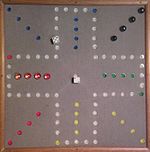 |
United States | Single six-sided die | Trademarked; accommodates up to six players, unlike most cross and circle games. |
| Ashte kashte |  |
Bengal, India | Four thrown cowry shells | Played on a seven-by-seven grid with four "resting spaces" on which pieces cannot be captured. Players may sit two of their own pieces on one square to block movement of enemy pieces. |
| Chaupar | 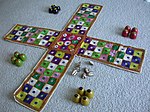
|
India | Six thrown cowry shells, or three four-sided long dice | Played on a cross-shaped fabric board. |
| Coppit | 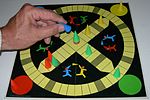
|
Germany | Single six-sided die | Originally named Fang Den Hut, or Capture the Hat. |
| Cranium | United States | Single six-sided die rolled after completion of an activity | Trademarked; players travel a circuit completing various activities in order to advance. | |
| Dayakattai | 
|
Tamil Nadu, India | Two four-sided brass long dice | The game is named after the brass long dice used to determine movement. |
| Headache | 
|
United States | Two standard dice within a clear plastic "pop-o-matic" dome in the center of the board. | Unlike most cross and circle games, the object is not to arrive at a "home base", but to mark all of the opponent's pieces with one's own color first. |
| Edris A Jin | Syria and Lebanon | Similar to pachisi | ||
| Jeu des petits chevaux | 
|
France | Single six-sided die | In English, the name translates to "the game of little horses," in reference to the game's small horse-shaped pawns. |
| Kimble | 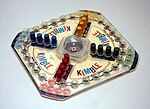
|
Finland | One standard die within a clear plastic "pop-o-matic" dome in the center of the board. | Trademarked; Finnish release of the American game Trouble There is an identical British version called 'Frustration'. |
| Ludo | 
|
England | Single six-sided die | Derived from the Indian game Pachisi, with simplified rules. Sold worldwide under a variety of local names. |
| Mensch ärgere Dich nicht | 
|
Germany | Single six-sided die | In English, the name translates to "hey, don't get angry," in reference to the fact that the game involves capturing other players' pawns. |
| Patolli | 
|
Mesoamerica | Five or six thrown marked black beans | Ancient Mesoamerican game played by a variety of Pre-Columbian cultures. |
| Pachisi | 
|
India | Six or seven thrown cowry shells | Has been played in India since at least the 16th century, and is considered the ancestor to many Western cross and circle games such as Ludo, Parcheesi, and Sorry!. |
| Parcheesi | 
|
United States | Two six-sided dice | Trademarked American adaptation of the Indian game Pachisi. |
| Parchís | 
|
Spain | Single six-sided die | Generic-name Spanish adaptation of the Indian game Pachisi. |
| Parqués | 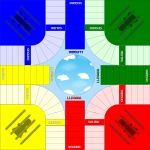
|
Colombia | Two six-sided dice | Parqués boards can be adapted to accommodate four, six, or eight players. |
| Sorry! | 
|
England | Cards drawn from a game-specific deck. | Trademarked; the game's title comes from the many ways in which a player can negate the progress of another, while issuing an apologetic "Sorry!" |
| Tock | 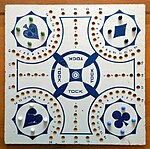
|
Quebec, Canada | Cards played from a hand of standard playing cards | Some playing cards have special functions such as extra movement. Some variations include joker cards. |
| Trivial Pursuit | 
|
Canada | Single six-sided die | Players travel around the board answering trivia questions on six different topics, and must correctly answer one from each topic in order to make it to the centre and win the game. |
| Trouble | United States | One standard die within a clear plastic "pop-o-matic" dome in the center of the board. | Trademarked; sold in the UK under the name Frustration. The game's dice have Arabic numerals rather than the typical pips. | |
| Uckers | 
|
England | Two six-sided dice | Primarily played in branches of the British Armed Forces, particularly the Royal Navy, which lays down the official game rules in its regulations. |
| Wahoo | 
|
Appalachia, United States | Single six-sided die | Regional variation of the traditional cross and circle game. Aggravation is a licensed version of the same game. |
| Yut | 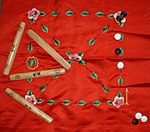
|
Korea | Four thrown marked sticks | Traditional board game associated with Korean New Year. |
| Zohn Ahl | 
|
Great Plains region of the United States | Four thrown marked sticks | Traditional board game of the Native American Kiowa people. |
See also
[edit]References
[edit]- ^ MacKenzie, Colin; Finkel, Irving L. (2004-01-01). Asian Games: The Art of Contest. Asia Society. p. 57. ISBN 9780878480999.
External links
[edit] Media related to Cross and circle games at Wikimedia Commons
Media related to Cross and circle games at Wikimedia Commons
 KSF
KSF